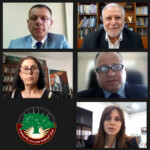Al-Zaytouna Centre for Studies and Consultations, in cooperation with the Palestinian Association for Human Rights (Witness), held a legal panel discussion via Zoom on 24/9/2025, entitled “Starving the Gaza Population: Israel’s Crime and International Responsibility.”
The session gathered legal experts and academics to discuss Israel’s systematic starvation policy against the people of the Gaza Strip (GS), where over 640 thousand face catastrophic famine (IPC Phase 5), and more than two million are denied access to food, amid ongoing assaults and the destruction of shelters and aid distribution centers.
The panel was chaired by Prof. Dr. Mohsen Mohammad Saleh, General-Manager of Al-Zaytouna Centre for Studies and Consultations, who opened the discussion by emphasizing that Israel is perpetrating one of the most egregious forms of human rights violations through the systematic use of starvation as a weapon against civilians in GS. He noted that these measures are implemented through carefully calculated mechanisms, including the use of artificial intelligence, describing the situation as a fully orchestrated crime committed in full view of the world. Saleh further highlighted that international law clearly criminalizes starvation, classifying it as a war crime and a form of genocide; however, the reality in the GS exposes a lack of political will to enforce the law. He stressed that this crime cannot continue without meaningful action from the international community.
In the first paper, titled “The Humanitarian Situation in GS and Starvation From a Legal Perspective,” lawyer, legal expert and university professor Dr. ‘Adel Yamin stated that “the humanitarian situation in the GS constitutes one of the most severe contemporary crises. Civilians are subjected to overwhelming, harsh and painful conditions due to the blockade, deliberate killings, clear attempts at extermination, starvation, the prevention of essential supplies, restrictions on basic provisions, and repeated deprivation of food, water and medicine.”
Yamin emphasized that the blockade and the use of starvation constitute a war crime explicitly recognized under international law, noting that the International Criminal Court (ICC) has jurisdiction to prosecute Israeli officials even if Israel is not a party to the Rome Statute.
He further explained that the San Remo Manual regarding humanitarian assistance, alongside the doctrine of Countermeasure, permit states to intervene to provide relief and humanitarian aid to GS even without Israel’s consent.
According to Yamin, the greatest obstacle is not the absence of laws but the lack of enforcement mechanisms and international political will. He emphasized that the international community possesses a comprehensive legal arsenal yet remains incapable of utilizing it effectively.
He underscored that the Geneva Conventions and the Rome Statute explicitly prohibit the use of starvation, classifying it as both a war crime and a crime against humanity. Yamin also highlighted that international silence regarding these crimes undermines the international legal framework and encourages impunity.
He further noted that reports by the UN and human rights organizations have documented the systematic deprivation of food and medicine, reinforcing the deliberate nature of the crime. Yamin concluded that the persistence of this situation presents the international community with a historic test of its commitment to fulfilling its obligations to prevent genocide.
In the second paper, titled “Humanitarian Assistance Between Legal Obligation and Political Instrumentalization,” legal expert and professor of international law Prof. Dr. Muhammad Al-Moussa emphasized that the GS crisis exposes a structural flaw in international law and a colonialist dominance that obstructs the realization of justice, calling for a fundamental reform to ensure the protection of peoples rather than the service of major powers.
Al-Moussa noted that “the systematic starvation of the Gaza population constitutes a war crime prohibited under the Geneva Conventions and, in some cases, may rise to a crime against humanity or even genocide if clear destructive intent is established.” He added that while the international legal framework is rich in provisions, the problem lies in the gap between the ideal texts of international law and what he termed “material international law,” which is subject to the balance of power and political interests.
He also highlighted that this contradiction reflects “a colonial legacy that continues to shape the structure of international law,” noting that postcolonial and Third World approaches provide critical tools to understand how law is sometimes used to entrench dominance rather than protect victims.
He emphasized that “the Security Council, through repeated US vetoes, has contributed to obstructing ceasefire resolutions and the delivery of aid,” viewing this as evidence of the need to restrict the use of the veto in cases of serious humanitarian concern.
Al-Moussa concluded by emphasizing the need to “move beyond merely reviewing texts to adopting practical approaches based on analyzing the normative framework of the right to assistance, exposing the implementation gap, and offering reform proposals that make international law a genuine tool for justice for oppressed peoples.”
He added that the ongoing siege and starvation risk turning the GS tragedy into a dangerous precedent that threatens the entire international legal system. He argued that the international community’s current inaction may pave the way for making the policy of impunity the norm rather than the exception.
In the third paper presented, Dr. Ahlam Beydoun, professor of Public and Private International Law at the Lebanese University, emphasized “the criminal dimension of targeting aid distribution points and exploiting them to direct displacement and achieve military objectives.” She argued that targeting civilians seeking humanitarian assistance constitutes a composite crime encompassing killing, starvation and forced displacement, and classifies as a war crime that could rise to the level of genocide under the Geneva Conventions and the Rome Statute. She stressed that proving these crimes requires establishing intent, whether implicit or explicit, and noted that UN reports and media sources document the deaths of hundreds and worsening malnutrition.
She also highlighted the possibility of investigation and prosecution through the ICC, special tribunals, and the International Court of Justice (ICJ).
Dr. Baydoun further underscored that political and military leaders bear individual criminal responsibility, while Israel is responsible as a state, and supporting countries, especially the US, carry special responsibility. She called on the PA to file complaints before the ICC. She concluded by asserting that the crimes of the Israeli occupation are not subject to statutes of limitations nor confined by geography, and that the Palestinian people’s resistance cannot be equated with the systematic violations committed by the occupation.
Dr. Alissar Farhat, lecturer in Law and Political Science at both Jinan University and the Lebanese University, explained in the fourth paper, titled “International Responsibility for the Protection of Civilians and the Prevention of Starvation,” international law explicitly prohibits the use of starvation as a method of warfare. She highlighted that international humanitarian law, particularly the Geneva Conventions (1949) and Article 54 of the Additional Protocol, explicitly forbids the use of starvation as a means of war. Furthermore, the Rome Statute classifies starvation as a war crime, and International Human Rights Law (IHRL) guarantees the right to life and access to food even during armed conflicts. In addition, the prohibition of starvation constitutes a customary norm that is binding even on states that are not parties to the relevant treaties.
She emphasized that starvation, as a war crime, requires proof of its deliberate use as a military weapon, and it may rise to the level of genocide if there is a specific intent to destroy a national, ethnic or religious group, according to strict judicial standards.
She also highlighted the associated legal responsibilities:
• State responsibility: to cease the act, provide reparations and ensure non-recurrence.
• Individual criminal responsibility: for military and political leaders before the ICC or national courts.
• Collective responsibility of the international community: under the principle of the Responsibility to Protect, which is hindered when veto powers are exercised in the UN Security Council.
She highlighted that the Security Council possesses tools such as sanctions, arms embargoes, and the opening of humanitarian corridors. However, the use of the veto, although formally legal, effectively obstructs international protection and undermines the Security Council’s credibility, noting that the US has repeatedly employed it to shield Israel.
The participants emphasized the urgent need to address the crimes committed, urging the international community to adopt a firm stance. This requires activating multiple legal and diplomatic mechanisms to achieve humanitarian justice, as outlined in the following points:
• The UN General Assembly must act through the Uniting for Peace resolution to overcome the paralysis of the Security Council.
• The ICC should be called upon to immediately open an investigation into the crime of using starvation as a method of warfare in GS.
• Legal awareness among law students regarding civilian protection should be strengthened.
• International pressure on the responsible parties must be intensified to ensure the sustainable delivery of humanitarian aid.
• UN mechanisms should be reformed to overcome the impact of the veto and ensure it is not used as a tool to obstruct action.
Valuable interventions were made by several experts participating in the panel discussion. Among them, Prof. Dr. Mohammad Tay, an international law expert, emphasized that the GS situation exposes “the failure of the international system to address major crimes,” drawing attention to the fact that double standards undermine the legitimacy of international law itself. He argued that “starvation is a tool of systematic extermination” employed by Israel to achieve political and demographic objectives, warning that the continuation of this reality risks reducing international law to a mere formal cover for the actions of major powers. Tay stressed that the absence of international justice compels oppressed peoples to seek alternative means of struggle to protect their existence and rights.
Hossam Shaker, researcher, author and media consultant specializing in international affairs, noted that “the starvation in GS is not a mere side effect of the war, but a deliberate policy targeting the social and human fabric of the Palestinian population.” He further explained that the silence of international institutions renders them implicitly complicit in this crime. Shaker emphasized that “extermination through starvation constitutes a stark ethical test for the global conscience,” calling for the activation of popular and media pressures to break the cycle of the siege. He also observed that history will record this period as a decisive benchmark for the credibility of the humanitarian values championed by the major powers.
Dr. Hafiz al-Karmi, former president of the Palestinian Forum in Britain (PFB), affirmed that “international law has become a selective instrument in the hands of powerful states.” He noted that the failure of UN institutions to halt starvation and extermination in GS reveals the extent of the imbalance in the structure of the international system. Al-Karmi further pointed out that “Israel exploits this bias to impose new realities on the ground, taking advantage of the cover provided by international inaction.” He called for building transnational human rights and grassroots alliances that would restore the notion of universal justice and put an end to the monopoly of major powers over international legitimacy.






Leave A Comment